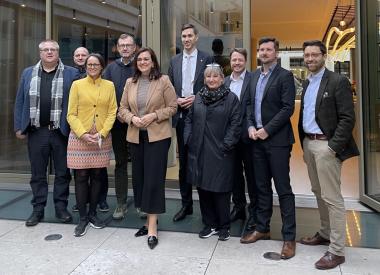BVMed Digital-Talk: Datenschutzregelungen harmonisieren und forschende MedTech-Industrie einbeziehen
In Deutschland greifen vielfältige Regelungen und Gesetze rund um das Thema Datenschutz und Gesundheitsdaten. Diese Heterogenität stellt eine Hürde für die optimale Nutzung von Gesundheitsdaten zur Verbesserung der Gesundheitsversorgung dar. Das beschreiben die Teilnehmer:innen aus Politik, Recht und Industrie des Digital-Talks des Bundesverbands Medizintechnologie e.V., BVMed, am 28. April 2022. „Wir sehen die dringende Erfordernis, die digitale Transformation der Prozesse voranzutreiben, zu harmonisieren, vorhandene Daten zu nutzen und auch die privaten Einrichtungen zur Forschung und Entwicklung mitzunehmen“, so Franziska Hoppermann, CDU-Abgeordnete und Mitglied im Digitalausschuss des Deutschen Bundestags. Dem stimmte Prof. Dr. Dr. Christian Dierks, Rechtsanwalt und Geschäftsführer von Dierks+Company, zu. Ein Zugriff der Industrie auf Gesundheitsdaten sei besonders wichtig, denn sie „investiert in Forschung und Entwicklung und geht die damit verbundenen Risiken ein, um Gesundheitslösungen zu entwickeln“, beschreibt Prof. Dierks. Der Digital-Talk widmete sich dem Thema „Nutzung von Gesundheitsdaten“ und diskutierte Herausforderungen sowie mögliche Lösungen für eine bessere Gesundheitsversorgung.
In den letzten Jahren wurden viele Initiativen und Aktivitäten für eine digitale Gesundheitsversorgung angestoßen. Diese Entwicklung soll laut Koalitionsvertrag fortgesetzt werden. Dabei wird von der MedTech-Branche insbesondere das sogenannte „Gesundheitsdatennutzungsgesetz“ erwartet. Der BVMed begrüßt ein solches Gesetz und setzt sich dafür ein, dass auch der Gesundheitsindustrie der Zugang zu Daten ermöglicht wird. Deshalb widmete sich der erste BVMed Digital-Talk 2022 direkt der Fragestellung „Zwischen Datenschatz und Datenschutz: 2022 als Schicksalsjahr für Nutzung von Gesundheitsdaten?“. Moderiert wurde die Veranstaltung von Dr. Joachim Haes, Sprecher des BVMed-Arbeitskreises Digitalisierung sowie Director Government Affairs DACH und Osteuropa bei Intuitive Surgical.
Weitere Informationen finden Sie hier.
BVMed






























